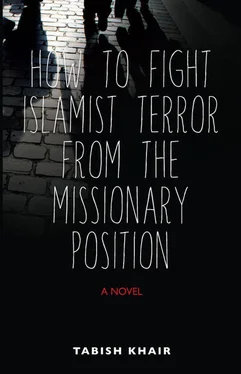Ravi and Lena moved in tandem, even when they were in different groups. They had ears for each other while they were holding a conversation—easy, attentive, graceful—with other people. Even their backs had eyes for each other.
They were both highly polished in their social skills: people who were born naturally elegant and had honed their elegance to perfection. Ravi, in his own couldn’t-care-less way, with his clothes just a bit but stylishly awry, his long hair ruffled and loosely curling; Lena in her closely coiffured and dressed, highly reserved manner, everything always in place.
I remember thinking: they will probably stay elegant, in different ways; Ravi with quicksilver ebullience, effusively, Lena with icy calm, on the deck of any sinking Titanic.
They circulated and conversed with ease, plastic glasses of wine poised, sparkling. With my prior knowledge, it was difficult to understand how the company around us failed to see what I saw. Even though Lena and Ravi were excellent conversationalists, with a dozen languages between them, it was obvious to me that their conversation assumed a special sparkle only when they were in the same circle.
For me, though, infected surely by Ravi’s enthusiasm and sense of wonderment at what had happened between them, it was like a miracle gone unremarked: as if someone was walking on water while people went about their barbecue parties all over the beach, poking sausage and salting steak on their grills, and guzzling down beer.
Ravi snuggled comfortably into the Native American blanket that he often used for a shawl indoors.
“You see, bastard,” he said, “you as a bloody Mussalman from the Land of the fucking Pure have only two options in the lands of Unbelievers if you want to intrigue a damsel in distrust. Either you talk about how you, at the age of fourteen, broke into your piggy bank and stole money from your traditional dad’s wallet to go whoring, or you talk about how you grew up praying five and a half times a day and admiring the mujahideen until, O Heart, O Torn and Riven Heart, as recently as a year ago you began to lose your faith—but, alas, not your confusion or anger. Give ’em either of the two narratives, and they’ll beat yuh to the draw when it comes to dropping yer respective panties. But lookit yerself! Look at yourself, you sad unpackaged commodity! You talk about your schooling, which is like their schooling; you talk about your parents, who are like their parents; you talk about your life, which is like their life. They look at you and expect something else. You look like you are something else. And then you go ahead and disappoint them. And you, a fucking scholar of literature who should know better! Shame on you!”
“What about you, Ravi? How come you have been getting away with having more of their lives than they do themselves?”
“Not any more, bastard: I am a one-woman man now. It’s only Lena for me. Never thought I would be like that, damn it, but I have no desire even to look at another woman.”
“Still,” I insisted, “let’s consider your checkered career until you saw the, ahem, golden light.”
“Ah well, it is different with me, Ignorant Human,” he replied, sipping his coffee. “You see, I’m not just a wyrd buggah; I am a Hindoo from Inja. I can dance to the tune of a hundred instruments on the thousand arms of my million gods, half of them hermaphrodite. Moreover, thanks to you fundamentalist bastards, I am Prester John these days.”
“Prester John?”
“Don’t tell me you ain’t never heard of Emperor Prester John, you half-injun?”
I had come across the name in books, but could not recall the connection.
Ravi continued in his oratorical mode, which had increased in scope and vibrancy ever since he dropped all his “plain” girlfriends for Lena: “You have missed something. See, this is the twelfth century, if I remember correctly. Ok? Twelfth century. Europeans are frightened of the Saracens. Suddenly, good news: it appears that on the other side of the Islamic threat there is a powerful Christian emperor, Prester John, just waiting to join forces with European crusaders. Hallelujah! For centuries, he is there, on the other side of every Islamic threat, real or imagined, about to come to the rescue of Christendom. Only, poor Prester John never existed.”
“So?” I did not get the connection.
“So, over the centuries, a large number of Europeans have needed this mythical Prester John. Sometimes, when they get really desperate, they even Prester John a Muslim people, as they did with the Arabs when Lawrence of Arabia was waging his jihad against the Ottomans. Lately, behold, O Fanatical Believer, ancient Hindoo Inja is the new Prester John: the great non-Muslim ally on the other side of the crescent! We are in, old boy; they actually smile at Indian passports at Customs sometimes. The first time it happened to me, a few months after 9/11, I almost fainted with the shock. Our chances to lay la lasses increased triple-fold after 9/11. Provided we do not tie a turban around our heads, as some silly Sikhs still do, and get them all confused because they have seen cartoons depicting your Mohammad in a turban.”
The history lesson about Prester John that Ravi had poured into my ears emanated mostly from his desire to fix me up with a girlfriend. He had always wanted to do that, ever since I got divorced. Most of it was concern for me—he suspected that I still missed my ex-wife. He was probably right: my divorce had been a difficult decision. I had still been partly in love with my wife, but I could no longer ignore the fact that, while she wanted children immediately, I had no desire to become a father.
The fact that we had tried naturally for a couple of years had been easy for me to overlook. But when she started insisting on us going to the clinic—there was nothing “wrong” with either of us, as the doctors told us, but she did not want to wait any longer—it made me face up to my own reluctance. I could no longer ignore it. Neither could I ignore my deep dislike of the clinic: it seemed to me, and still does, that we were forcing nature, when nature actually had not given us any real ground to use force against it. My wife had disagreed.
That morning with the plastic container and the patrol car had made up my mind, but my wife had not been able to accept the decision. I did not blame her: after all, it is the woman who bears a child, carries it around for nine months, suffers changes in her own body. And when we finally got divorced, I was saddened. My wife too, I am sure, but she felt that my refusal to return to the clinic was an indication of my lack of love for her. I wasn’t convinced of that; she was. It made it easier for her to leave.
Ravi knew all this; Ravi and I seldom had secrets from each other—or, given the aunts in Ravi, at least I didn’t have secrets from him. He must have felt that I needed a girlfriend. The sporadic dating I did was not enough, as he told me, and he never understood why I was so careful about entering another relationship.
“What are you waiting for, you Paki?” he asked me. “A houri from fucking paradise?”
I thought that his concern about my love life would diminish after he had hooked up with Lena. But now that he had himself found someone whom he obviously saw as a “houri from fucking paradise,” he grew even more concerned. He wanted to fix me with a partner. There was always a romantic in Ravi, buried under a few tons of skepticism and irony: I am sure he liked to imagine us together, as paired couples, going for trips and walks and treks in the glorious Danish summer that was now around the corner.
“I don’t believe in houris or paradise,” I replied.
“Well,” he mused, “don’t be so bloody sure of it: I thought so too until I met Lena. But anyway, what’s wrong? Why is it you have not found any pretty pige, merry mademoiselle or fine fräulein yet? What is so fucking wrong with all these lovely young ladies you have dated and dropped?”
Читать дальше












